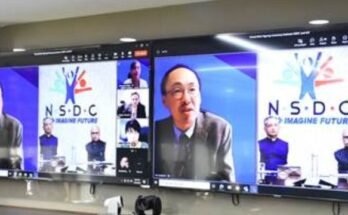Geneva : The Global Skills Forum, a prestigious assembly of government representatives, employers, workers’ organizations, skill development experts, development partners, and international agencies, convened virtually and in person on 23 – 24 April. This event, held against the backdrop of the European Year of Skills, served as a platform for robust discussions, knowledge exchange, and collaboration to propel the global skills development agenda forward.
During the forum, participants from diverse regions engaged in lively discussions, sharing insights and best practices to address the evolving challenges in the world of work and equip the workforce with the skills necessary for present and future labor markets. The deliberations underscored the transformative role of skills development in advancing social justice and combating inequalities, particularly in the context of the triple transitions: greening, digitalization, and demographic shifts.
At the event, Gilbert F. Houngbo, Director-General, ILO said “In the context of the ongoing artificial intelligence revolution, there’s a pressing need to elevate skill development, upskilling, and reskilling initiatives.”
On the first day, the forum spotlighted the critical importance of investing in skills intelligence to mitigate mismatches and seize emerging opportunities. Participants emphasized the relevance of initiatives such as the Quality Apprenticeships Recommendation and the International Labour Organization’s (ILO) skills and lifelong learning strategy. Testimonies from young apprentices from Switzerland and Tanzania underscored the life-changing impact of apprenticeships.
The second day delved into the imperative of social dialogue and collaboration among stakeholders to drive systemic change in skills development. Participants emphasized the necessity of fair and inclusive transitions, increased employer investment in digital literacy, and the integration of skills development into broader policy frameworks for inclusive economic and social progress.
“By promoting lifelong learning, diversity, and inclusiveness, countries can adapt to the challenges posed by climate change, an ageing population, and technological advancements, paving the way for a greener, more equitable future.”, said Mia Seppo, Assistant Director-General, Jobs and Social Protection, ILO.
Throughout the forum, speakers stressed the urgency of proactive skills policies and resilience-building measures to address economic and societal challenges effectively. The event culminated in a resounding call to action for continued cooperation and innovation in skills development to meet the dynamic demands of the global economy. The establishment of the Global Network of Champion Organizations for the promotion of quality apprenticeships highlighted the commitment to collective action.
Moreover, the forum underscored the imperative of championing a “skills revolution” through proactive approaches to skills policies, focusing on anticipation, adaptability, and inclusion. This collective endeavor aims to pave the way for decent work opportunities and societal transformation.
As the Global Skills Forum concluded, participants reaffirmed their commitment to driving positive change and shaping a more inclusive and resilient future for skills development worldwide. The call to action resonates with the belief that through collective effort and action, we can create a world where skills empower individuals and societies to thrive.




